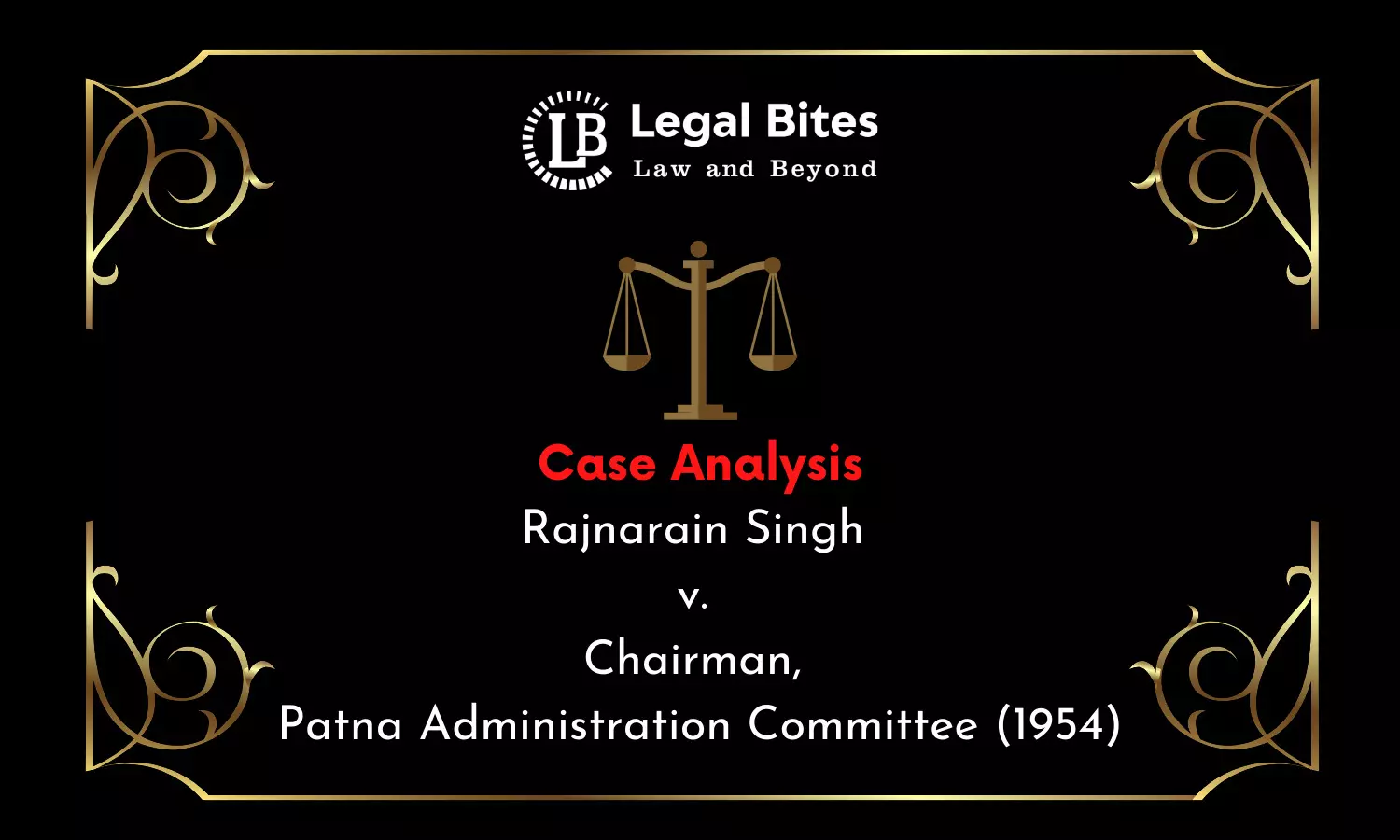Case Analysis: Rajnarain Singh v. Chairman, Patna Administration Committee (1954) | Delegated Legislation
The case of Raj Narain Singh v. Chairman is a significant legal precedent that deals with the scope of administrative authority.

The case of Raj Narain Singh v. Chairman, Patna Administration Committee, is a significant legal precedent that deals with the principles of natural justice and the scope of administrative authorityCase Name: Rajnarain Singh v. Chairman, Patna Administration CommitteeCourt: Supreme Court of IndiaCitation: AIR 1954 SC 569Judges: Vivian Bose(J), Mehar Chand Mahajan(J), B.K. Mukherjea(J), Natwarlal H. Bhagwati(J)Date of Judgment: 21/05/1954IntroductionIn the case of Rajnarain Singh v....
The case of Raj Narain Singh v. Chairman, Patna Administration Committee, is a significant legal precedent that deals with the principles of natural justice and the scope of administrative authority
Case Name: Rajnarain Singh v. Chairman, Patna Administration Committee
Court: Supreme Court of India
Citation: AIR 1954 SC 569
Judges: Vivian Bose(J), Mehar Chand Mahajan(J), B.K. Mukherjea(J), Natwarlal H. Bhagwati(J)
Date of Judgment: 21/05/1954
Introduction
In the case of Rajnarain Singh v. The Chairman, Patna, the issue at hand pertained to the interpretation and application of Section 3(1)(f) of the Bihar & Orissa Municipal Act, which granted the local administration of Patna the authority to make modifications to certain sections of the Bengal Municipal Act 1884. The key contention revolved around whether the provisions of the Bengal Municipal Act 1884, particularly related to taxation, could be modified by the local administration without adhering to principles of natural justice.
Facts
Raj Narain was the secretary of the Patna Ratepayers Association. He and other people were living in the village named Yarpur which was outside the limits of Patna and thus this was not subject to municipal or taxation. However, it was alleged that the appellant and other members had to pay taxes from 1st April 1951 to 31st March 1952. The appellants filed this case, that no community living in that area should be forced to pay taxes. Sections 3(1)(f) and 5 of the Patna Administration Act of 1915 were used to issue the notifications. Hence, the notification was unconstitutional.
Issues
- Whether the purpose of the Act had been defeated as the notification did not provide the opportunity for residents to be heard and to object.
- Whether the notification was ultra vires of the Act based on its delegated legislative authority.
Judgment
In this case, it was decided that transfer only allowed an executive authority to change some parts of the law that had been made. It was also emphasized that defining an essential quality cannot be done in general terms. Therefore it is explicit that, within certain limits, legislative duties can be given to executive authorities. It cannot be said that all of these different rules should be made by Parliament and that any changes that need to be made to them to deal with the problems of day-to-day administration should also be made by Parliament, with all the delays that come with passing laws.
Analysis
It is the authority of the Legislature to give others the power to make rules that will carry out the goals of the laws it makes. So, the Parliament can give the Central Government the power to make rules about hiring people and their working conditions.
Delegated Legislation
The Constitution has given the power to the legislature to make laws. There are various welfare activities which make it impossible for them to conduct all the functions at a time. This brings the delegated legislation where the legislature has given its authority to the executive to implement those laws which were made by the legislature.
Therefore, the respondent has contended that there was no violation of the Act, there was delegated legislation and the notification was not beyond the power of the authorities.
Section 3 (1) of the Patna Administration Act, 1915 gave the Local Government the power to apply any part of the Bengal Municipal Act, 1884 to Patna, with any changes and restrictions that the Local Government saw necessary. Section 5 of the same 1915 Act said that the Local Government could cancel or change any order made under Section 3 at any time.
The Court said that the Governor's action of taxing people in Patna without following Sections 4, 5, and 6 of the Bihar and Orissa Municipal Act, 1922 is not in line with one of its most important parts and is unfair, so the Notification is not good.
The Act of 1922 covered all of Bihar and Orissa. One of its main rules was that no area could be forced to pay taxes to the community living in this area. Also, the people living in the area have the chance to be heard and to object without this opportunity it will be against the principles of natural justice.
As a result, the Act makes it clear that the Local Government has to listen to the complaints and think about them before making a decision. This is because of a rule made by the Legislature. This meant that the case decided that the Notification changed the Act's policy in a big way, went beyond what was allowed by “section 3 (1) (f)”, and was therefore unconstitutional.
The authority can change laws that are already in place or that will be made in the future, but not in any important way. It's not possible to say in broad terms what an important feature is, and people had different opinions on this in the first case. But the above opinions make one thing clear: it can't include a policy change.
After being changed, it does two things: firstly, it provides delegated legislation to choose any part of the “Bihar and Orissa Municipal Act of 1922” and apply it to "Patna"; secondly, it gives powers to the Local Government and the Governor to use their authority with restrictions or any modifications whatever they want to do. Therefore, the notification passed was against the principles of natural justice and hence, it has ultra vires to the provision of the Act.
Important Links

Vanshika Kapoor
Vanshika Kapoor, a committed writer and adept researcher, acquired her BBA-LLB from Amity University Chhattisgarh, followed by her LLM from UPES Dehradun.
